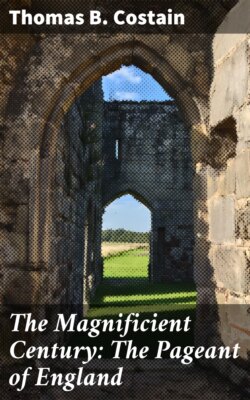Читать книгу The Magnificient Century: The Pageant of England - Thomas B. Costain - Страница 15
Peace Comes to the Land and Death Comes to the Marshal
ОглавлениеPeace was signed on September 12 on an island in the Thames at Kingston, with a proud queen mother and an exuberant young king to watch the proceedings. Louis was to withdraw from England and to forswear his claims to the crown. He agreed, moreover, to bring persuasion to bear on his father to restore Normandy and the Angevin provinces to the English King. This was a futile gesture: Philip Augustus, that passionately ambitious monarch, would never yield an inch of the territory he had won. Louis entered into a definite undertaking to restore the Channel Islands to England, expelling the brothers of Eustace the Monk therefrom.
On their part, the English agreed to proclaim an amnesty and to restore all lands and possessions of the barons who had fought for the French. They were to pay the beaten prince the sum of ten thousand marks to finance his withdrawal, Louis being now completely without funds.
The terms were easy. Some violent partisans wanted to force the French to surrender without conditions, but it is worth noting that none of them belonged to the relatively small group which began the struggle in support of the boy King and had borne the heat and the responsibility of it. William the Marshal again held out for moderation on the ground that England needed peace. He wanted above everything else to see the French out of the country and a start made at repairing the ravages of civil war. The legate was of the same opinion, although he refused to have the amnesty extended to the churchmen who had allied themselves with the invaders; Rome would attend to the disciplining of its own people. The verdict of history has been that they were right in not holding out for more rigorous terms, that the country benefited immeasurably by the quick ending of hostilities.
The vanquished Louis, somber and chill in defeat, sailed from Dover before the month was out, with his most unpleasant task still ahead of him, that of facing Philip Augustus and explaining his lack of success.
The long civil war had come to an end. In November of that year Eustace of Fauconberg was appointed treasurer and the Exchequer began again to function normally at Westminster. Early in the following year, 1218, the judges set out on their circuits and again cases were tried and justice was administered as in the good days of Henry II. Stephen Langton, the great archbishop, was at last allowed to return from his exile in Rome. He landed at Dover in May 1218 and was greeted like a conquering hero, great crowds swarming about him, to kiss his hands, to see his benign and resolute face. He was an old man but as conscious as ever of great tasks to be accomplished. Resuming his functions at Canterbury immediately, he was largely responsible for the affirmation of Magna Charta at a council held in London shortly thereafter.
On Whitsunday, 1220, the boy King was crowned again, with proper robes and regalia and with all the ostentation which had been lacking at his first coronation. Stephen Langton officiated, and the noblemen with hereditary roles to play came forward eagerly to perform them, even the owner of Addington presenting his dish of dilligrout in the traditional manner. The records state that “the feasting and joviality was such that the oldest man present could remember nothing like it at any previous coronation.”
